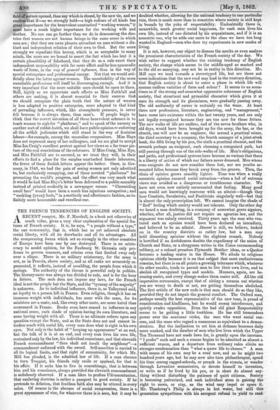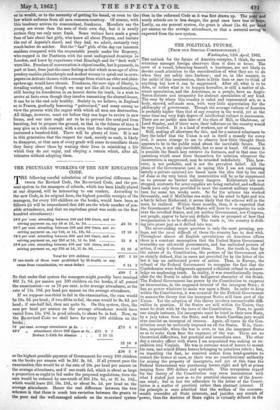THE FRENCH TENDENCIES OF ENGLISH SOCIETY.
ARECENT essayist, Mr. F. Marshall, in a book not otherwise of mach value, gives a very clear explanation of the special fea- tures of French society. It is, he says, "a people without a type," the one community, that is, which has as yet achieved absolute social liberty, with all its drawbacks and all its advantages. All the compressing forces which act so strongly in the other countries of Europe have been one by one destroyed. There is no aristo- cracy to model opinion, for the Faubourg St. Germain only pro- fesses to govern manners, and retains even that limited sway only over a clique. There is no military aristocracy, for the army is not, as in Prussia, above society, and as all ranks are accurately re- presented, it reflects, instead of moulding, the people from which it springs. The authority of the throne is powerful only in politics. The literary caste was always too divided to rule, and is for the hour in fetters. The mob does not impose any laws, for the French ideal is not the people but the State, and the "tyranny of the majority" is unknown. As to individual influence, there is, as Talleyrand said, no loyalty to a person left in France. Even religion, though it has an immense weight with individuals, has none with the mass, for its ministers are a caste, and, like every other caste, are more hated than reverenced in France. Books even have ceased to influence in any national sense, each shade of opinion having its own literature, and none having weight with all. There is no ultimate referee upon any question except the State, and as the State does not and cannot in- terfere much with social life, every man does what is right in his own eyes. Not only is thehabit of "keeping up appearances" at an end, but the talk of it is at an end, and every man lives his own life, restrained only by the law, his individual conscience, and that eleventh French commandment "thou shalt not insult thy neighbour"—a commandment enforced with the sword. Self-assertion is carried to all its logical limits, and that right of eccentricity, for which Mr. Mill has pleaded, is the admitted law of life. If a man chooses to turn Trappist, his friends only smile or applaud, for that is his affair. If it suits him to live in concnbinage, that is between. him and his conscience, always provided the eleventh commandment is sedulously observed. If a man likes to profess Ultramontanism, that enslaving doctrine is rather a passport to good society. If he pretends to Atheism, that fruitless faith also may be uttered in every salon. Of course in the absence of social compression, there is a great appearance of vice, for whatever there is is seen, but it may be doubted whether, allowing for the national tendency to one particular vice, there is much more than in countries where society is still kept in bounds by the yoke of respectability. Undoubtedly there is, meanwhile, much greater social happiness, for each man lives his own life, instead of one dictated by his acquaintance, and if it is an eccentric one, why he adds one more to the class we have too long wanted in England—men who dare try experiments in new modes of living.
It is not, however, our object to discuss the merits or even analyze the prominent characteristics of the French society of the day. We wish rather to suggest whether the existing tendency of English society, the change which seems to the middle-aged so marked and to the old so annoying, may not be in reality in this direction. Mr. Mill says we tend towards a stereotyped life, but are there not some indications that the new road may lead in the contrary direction, that English society is about to enter a phase in which life will assume endless varieties of form and colour ? It seems to us some- times as if the strong and somewhat oppressive coherence .of English society, that structural and pyramidal character which gives it at once its strength and its gloominess, were gradually passing away. The old uniformity of career is certainly on the wane. At least three new professions, literature, engineering, and "management," have come into existence within the last twenty years, and are only not legally recognized because they are too new for those fetters. The new walks of life are endless, and of the seven brothers who, in old days, would have been brought up for the army, the bar, or the church, one will now be an engineer, the second a practical miner, the third secretary to a company, the fourth manager of a joint-stock bank, the fifth living by his pen, the sixth a practical chemist, and the seventh perhaps an emigrant, each choosing a recognized path, but still passing through one of the side-walks of life. Men's obligations, and paths, and professional systems have become so various that there is a liberty of action of which our fathers never dreamed. Men whose sons emigrate do not now consider them lost, nor are youths ac- counted fallen because they break away from the groove. Then, the chain of opinion grows sensibly lighter. Time was when a really eccentric opinion ensured social ostracism—when a lad of extreme views was avoided as a dangerous or troublesome character. We have not even now entirely surmounted that feeling. Many good men would not knowingly converse with an atheist—though they bear Comtists, Secularists, and Positivists singularly well—but that is almost the only proscription left. We cannot imagine the shade of "Red" feeling which society would not tolerate. Only the other day we heard a man doubting, in a company of somewhat grave signiors, whether, after all, justice did not require an agrarian law, and the argument was calmly received. Thirty years ago the man who ven- tured such an opinion would have been declared an incendiary, and believed to be an atheist. _Dissent is still, we believe, looked on in the country districts as rather low, but a man may hold dissenting opinions without the slightest remark. Nobody is horrified if an Archdeacon doubts the expediency of the union of Church and State, or a clergyman writes in the Union recommending celibacy, or a colonel preaches Plymouth Brother ideas, or a Quaker becomes a leading orator in the House. We allude to religious opinions chiefly because it is on that subject that most exclusiveness remains, but there is on all points a growing tolerance which, whatever its other results, tends to permit men to live their own lives, and to abolish all recognized types and models. Manners, again, are be- coming easier, and every change makes them easier still. All the old imperative ceremonies, except that of sitting a sermon out whether you are weary to death or not, are getting themselves abolished. The first article of the new code is that men should do as they like, provided they do not impair the general comfort. The Oxford man, perhaps usually the best representative of the new tone, is proud of consideration and kindliness, but he would resent interference, and quietly evades opposition. Even the bad old giant Respectability seems to be getting a little toothless. He has still tremendous power over the nouveaux riches, the men who want social suc- cess, and the mass who regard a consensus as equivalent to a demon- stration. But the inclination to set him at defiance becomes daily more marked, and the ;lumber of men who live lives which the Upper Ten Thousand have not made laws for, is greatly upon the increase. "I prefer" such and such a course begins to be admitted as almost a sufficient reason, and a departure from ordinary rules elicits no stronger condemnation than "what a queer life to choose." A man with means of his own may be a rone now, and so he might two hundred years ago, but he may now also turn philanthropist, spend his time among ragged-schools, or preach in the streets, or wander through Levantine monasteries, or devote himself to invention, or write as if he lived by his pen, or in short do almost any- thing without disturbing the patience of quiet citizens. Society is becoming pulverized, and each individual atom is gaining the right to move, or stay, as the wind may impel or spare it. Mr. Thackeray's Philip is always in hot water, but still this generation sympathizes with his arrogant refusal to yield to rank or to wealth, or to the necessity of getting his bread, or even to the law which enforces from all men common courtesy. Of course, with this tendency arrives its concomitant, frankness. Moralists say the young are worse than the men of their own day, but it is nearly certain they are only more frank. Some writers have made a great fuss of late about fast girls, who know all about Phryne, and imitate the cut of Aspasia's shawl, and they had, we admit, certainly very much better do neither. But the" fast" girls of the day are innocent maidens compared with the respectable people under the Regency, who supped in the Pantheon with the most undisguised demireps in London, and knew by experience what Ranelagh and its "dark walk" -were like. Freedom of conversation is objectionable, but it proceeds, in part at least, from just the same feeling as that which in an age of ultra- prudery enables philanthropic and modest women to speak out in news- papers on delicate themes with a courage from which an elder and plain- spoken age would have shrunk. Frankness, the sure sign of liberty, is invading society, and though we may not like all its manifestations, still having its foundation in an honest desire for truth, in a wish to arrive at facts even though they involve ransacking the charnel-house, it can be in the end only healthy. Society is, we believe, in England as in Franca, gradually becoming "pulverized," and many among us view the process with the regret with which all men see destruction. .AR things, however, must rot before they can hope to revive in new forms, and our care ought not to be to prevent the seed-pod from bursting, but to prepare the ground, so that in the fulness of time it may give us a rich renewal, with a crop that the rotting process has increased a hundred-fold. There will be plenty of time. It is not in this generation that the respect for rank, merely as such, is likely to disappear, or that men of every grade will cease to conciliate those they fancy above them by wasting their lives in mimicking a life which they do not enjoy, and obeying a coterie which, after all, tolerates without adopting them.































 Previous page
Previous page